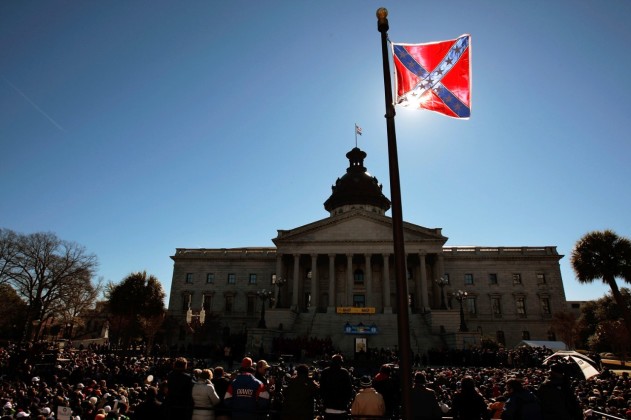South Carolina’s Confederate flag needs to come down. But don’t let a symbol of racism draw our attention from the systemic inequality and hatred it represents.
Let’s start here: South Carolina should take down the Confederate flag down that’s flying over its capital.
I say this as little more than a spectator. I am a 34-year-old white guy from Philadelphia. My only experience with South Carolina is what blurred past my window on a road trip. I have no experience of its people, even less of its culture. I am a tourist at best. And yet, in so many ways, I am defined by what is flying over its capital.
First Amendment purists will maintain the people of South Carolina shouldn’t be made to take the Confederate flag down. But the legislature of South Carolina should absolutely choose to respect the wishes of so many Americans (and, ya know, the tenets of basic human decency), and remove the Confederate flag from their state capital—and ideally, everywhere.
Here’s the rub, though: While it should absolutely be taken down, doing so won’t actually change anything. It’s a gesture. A metaphor. And we are entirely too easily mollified by gestures.
The fate of this particular flag has overwhelmed the media right now. It’s being discussed on every news channel, editorialized and analyzed and explored in countless magazines and blogs. Facebook is replete with endless threads debating and pontificating on either side of the issue. It’s the one hashtag to rule them all.
But all I can wonder is what the actual outcome of its removal would be.
The lowering of the flag would be a kind of victory, yes. For well over a century, it has been a symbol of hate and violence and treason, and to fly it today over a state capital is a symbol in and of itself. It is a tacit suggestion that the government of that place, and the people it represents, endorses those beliefs. It’s vulgar and hateful, and a daily reminder to some that they will never be truly welcome, and that the suffering their ancestors endured, and the inequities they themselves must face are alive and well right there…in the seat of that state’s political leadership.
Lowering that flag would be a victory of symbolism, for certain.
But symbols don’t solve the problem. Too often, it’s symbols that are the problem. The election of Barack Obama was a symbolically rich event. One that moved millions, myself included, with its meaning and power. And one that allowed some to develop one of the more insidious euphemisms into our language to date—that America is, by virtue of President Obama’s election, somehow “post-racial.” It is a kind of rhetoric tirelessly trotted out by conservative pundits: Our President is black. Our President is a symbol. Truly, racism is dead and gone.
And yet according to the Center on Juvenile and Criminal Justice, African-Americans are “incarcerated at nearly six times the rate of white Americans.” According to statistics compiled by the NAACP, “five times as many white Americans are using drugs, yet African-Americans are sent to prison for drug offenses at 10 times the rate of whites.”
President Obama’s election very well may inspire our future, but it does nothing to correct the sins of our past—because there is a tremendous difference between the symbols of race and the realities of race. Those realities and the horrifying effects they have on our neighbors remain unchanged no matter how many symbols we erect or pull down.
President Obama recently said something similar in an interview on Marc Maron’s “WTF” podcast:
“Racism,” he said, “we are not cured of it. And it’s not just a matter of it not being polite to say the word ‘nigger’ in public. That’s not the measure of whether racism still exists or not. It’s not just a matter of overt discrimination. Societies don’t, overnight, completely erase everything that happened 200 to 300 years prior.”
Immediately following the release of this podcast, American media outlets lit up with debate. Did they debate the merits of his perspective? The scads of observable evidence which bear out his point of view?
No. They debated whether or not he should have used the word “nigger.”
Racism isn’t just a word. It isn’t just a flag. It isn’t just a symbol. Racism is a weed—plunging, stubborn, and strangling—something you have to kill at the root, if you ever want to be rid of it.
The men and women protesting in South Carolina right now understand far better than I ever will the toil that remains to turn a symbolic victory into something real.
And doubtless, they have known and lived an inequity I’ve only read about.
That’s why I’m not writing this to them. I’m writing this to people like me: Men and women of privilege who talk about these symbols, without ever having to bear the weight of what they mean. People who rant and speechify and tweet, tweet, tweet our ideas and feelings on the matter in lieu of action. Those who experience the grim realities of American racism in passing, through the glass of their television screen or tablet or smartphone, on their way to somewhere, anywhere else.
We should take the flag down. Yes. And once it is gone, we should feel pride in its absence.
But let’s not for a moment think that its removal erases the very real and persistent inequities it represents. Or that we are in any way released from our responsibility to act, to vote, to work, and to fight for the betterment and equality of our neighbors.
Andrew Panebianco is a writer and a teacher in Philadelphia. His work has appeared in The Nervous Breakdown, Brevity, The Citron Review, and The Splinter Generation. He is a professor of Creative Nonfiction at St. Joseph’s University, and received his MFA in Creative Nonfiction from Antioch University Los Angeles. You can find him on WordsThatArent.com.
Related Links:

